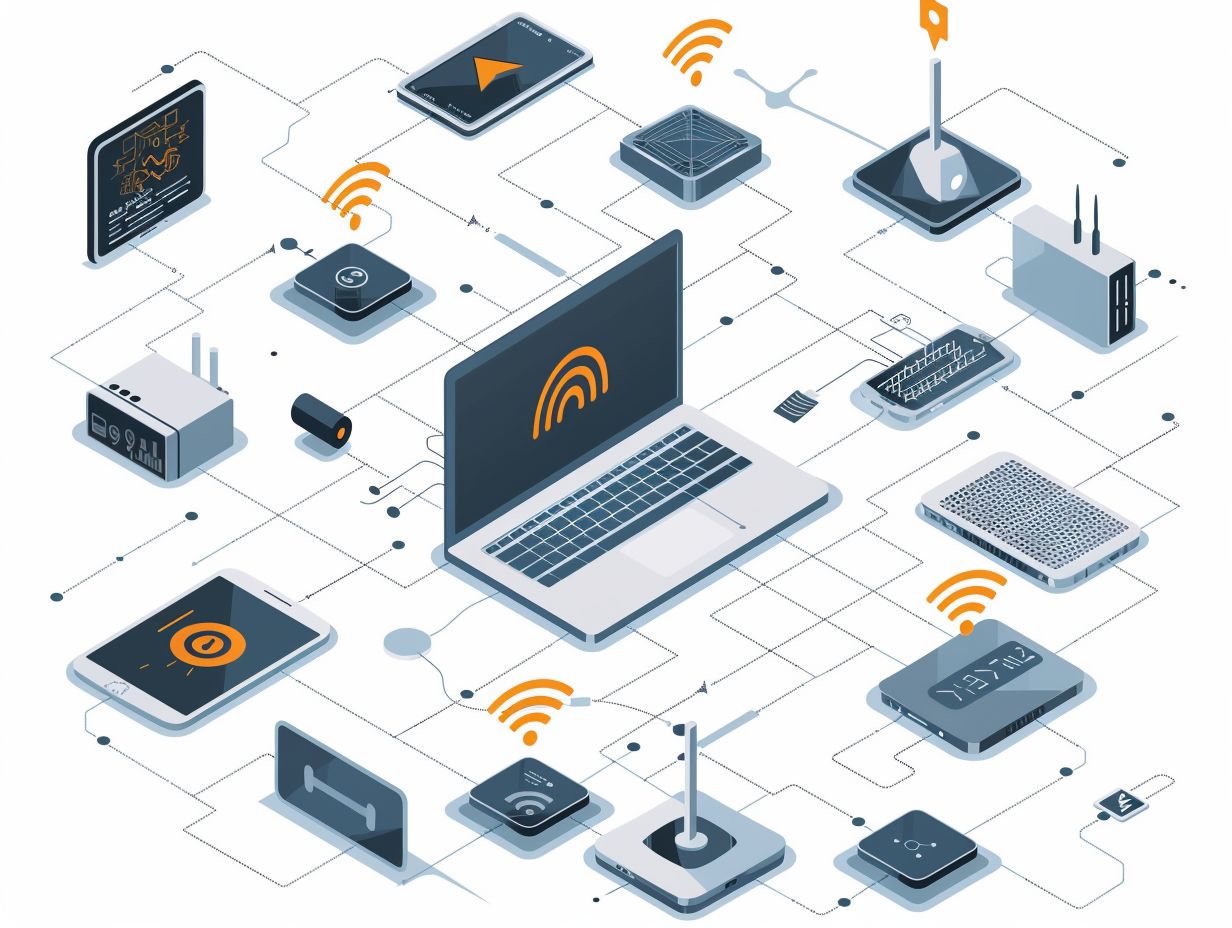If you are seeking to elevate your proficiency in the realm of wireless technology, consider Cisco’s Wireless Certifications. This article delves into the details of these certifications, highlighting the advantages they provide to IT professionals and businesses alike. Covering various tracks, examination preparation tips, and the lucrative career prospects that lie ahead, this thorough guide aims to assist you in realizing your full Wi-Fi capabilities with Cisco.
Key Takeaways:

Overview of Cisco’s Wireless Certifications
Cisco’s Wireless Certifications provide you, as a professional, with the knowledge and skills necessary to effectively design, implement, and manage Wi-Fi networks. These certifications encompass the latest wireless standards, technologies, and best practices aimed at optimizing router performance, ensuring reliable connections, and achieving high speeds across a variety of devices.
Given the Wi-Fi Alliance’s focus on advancements like Wi-Fi 7 and the utilization of the 6GHz spectrum, these certifications are essential for navigating the continuously evolving landscape of wireless internet.
The upcoming standard, Wi-Fi 7, is set to transform the wireless experience by offering faster speeds, lower latency, and improved capacity. Leveraging the unlicensed 6GHz spectrum provides a new band for Wi-Fi signals, reducing congestion and enhancing network performance. The Wi-Fi Alliance’s role in shaping these standards is crucial for ensuring interoperability among different devices and driving innovation within the industry.
In today’s digital ecosystem, optimizing performance for routers and devices is fundamental for maximizing throughput, minimizing interference, and providing seamless connectivity.
What are Cisco’s Wireless Certifications?
Cisco’s Wireless Certifications offer a variety of credentials tailored to different skill levels and job roles in the networking industry. These certifications cover areas such as configuring and troubleshooting wireless networks, securing Wi-Fi connections, and implementing advanced wireless technologies. Provided by Cisco Systems, a prominent networking equipment manufacturer, these certifications are essential for validating professionals’ expertise in effectively deploying wireless solutions.
At the entry-level of Cisco’s Wireless Certifications is the CCNA Wireless certification, which focuses on establishing a foundational understanding of wireless networking. Progressing further, professionals can pursue the CCNP Wireless certification, which delves deeper into wireless technologies and design principles. For those aspiring for the highest level of expertise, the CCIE Wireless certification showcases expert-level mastery in designing, deploying, and optimizing complex wireless networks. The most recent certifications, including the CCNP Wireless, were introduced in 2020, demonstrating Cisco’s dedication to remaining at the forefront of advancements in wireless technology.
Benefits of Cisco’s Wireless Certifications
Acquiring Cisco’s Wireless Certifications can offer numerous benefits to both IT professionals and organizations. These certifications serve as a validation of professionals’ expertise in deploying wireless solutions and demonstrate a dedication to keeping up with the latest technologies and standards established by the Wi-Fi Alliance.
Understanding the complexities of the 6GHz spectrum and optimizing wireless performance can greatly enhance the efficiency of network operations. This mastery allows individuals to develop and implement resilient wireless networks that improve connectivity, enhance data transmission speeds, and ensure robust security measures.
For organizations, having staff members with Cisco’s Wireless Certifications provides a competitive advantage in the industry, as they can deliver high-quality wireless solutions that align with the evolving requirements of modern businesses.
Advantages for IT Professionals and Organizations
When you achieve Cisco’s Wireless Certifications, you set yourself apart in the IT industry, demonstrating your ability to optimize router performance, establish seamless connections, and maximize wireless speeds. Employing certified professionals benefits organizations by improving network reliability, enhancing device compatibility, and boosting overall performance. This, in turn, results in increased productivity and customer satisfaction in today’s interconnected world.
These certified individuals are well-versed in designing, implementing, and managing wireless networks efficiently, which minimizes downtime and strengthens data security. By utilizing the expertise of Cisco certified professionals, organizations can ensure that their network infrastructure is resilient and scalable enough to meet the evolving demands of the digital landscape. The impact of Cisco’s Wireless Certifications doesn’t stop at network performance; it also elevates connection speeds, enhances device capabilities, and improves the overall user experience.
Cisco’s Wireless Certification Tracks

Cisco’s Wireless Certification Tracks offer you a structured pathway to specialize in wireless technologies, devices, and routers. These tracks focus on emerging trends, including the 6GHz spectrum and the latest advancements in wireless technology, providing you with a comprehensive learning experience to excel in designing, implementing, and managing wireless networks.
By pursuing these certification tracks, you can explore areas such as wireless security, network design, and troubleshooting. The coursework covers essential topics like wireless standards, RF technologies, mobility protocols, and network infrastructure. Hands-on labs and simulations will help you gain practical experience in configuring various wireless devices and routers. Through these specialized tracks, you can develop expertise in optimizing wireless performance, ensuring network reliability, and adapting to the ever-changing landscape of wireless communication technology.
Exploring the Different Paths
Cisco’s Wireless Certification Tracks encompass various paths that cater to different specializations within the field of wireless networking. From focusing on Access Points (APs) and Customer Premises Equipment (CPE) to diving into advanced technologies like Augmented Reality (AR) and Virtual Reality (VR), these tracks offer a diverse range of opportunities for professionals. Notable certifications such as the Netgear Nighthawk RS700S and Amazon eero Max 7 are included to address specific equipment and vendor-related expertise.
The comprehensive nature of these certification tracks allows you to acquire in-depth knowledge and hands-on experience in optimizing wireless networks for diverse business environments. Professionals pursuing these certifications gain insights into the latest industry trends and best practices for deploying, managing, and securing wireless infrastructures. With a focus on specialized equipment like the Netgear Nighthawk RS700S and Amazon eero Max 7, candidates develop proficiency in configuring and troubleshooting cutting-edge wireless technologies, ensuring you are well-equipped to meet the demands of modern networking environments.
Preparing for Cisco’s Wireless Certifications
Preparing for Cisco’s Wireless Certifications requires you to have access to a variety of study materials and resources that cover the latest advancements in wireless technology. As a professional, you can leverage online courses, practice exams, and hands-on labs to enhance your understanding of wireless concepts and configurations.
It is recommended to utilize devices such as laptops, smartphones, and tablets for practical exercises, as this can further solidify your knowledge and ensure your readiness for the certification exams.
The study materials typically consist of comprehensive guides, video tutorials, and interactive learning platforms that are specifically designed for aspiring wireless professionals like yourself. Access to simulation software that replicates real-world networking scenarios can provide you with invaluable hands-on experience. Additionally, online forums and study groups can be instrumental in sharing insights and collectively troubleshooting challenges.
Regularly testing your knowledge through practice exams will enable you to identify areas of improvement and focus on strengthening your weak points. By utilizing this combination of resources and technologies, you can stay up-to-date with the dynamic field of wireless networking and excel in your certification pursuits.
Study Materials and Resources
As an aspiring candidate pursuing Cisco’s Wireless Certifications, you can access a variety of study materials and resources to aid in your exam preparation. Online guides, official courseware, and interactive learning platforms are available to provide you with comprehensive support.
Additionally, attending prominent industry events like CES 2023 and gaining insights from experts like Allisa, a recognized Computing Staff Writer, can offer valuable perspectives on wireless technology trends and effective exam preparation strategies.
The study materials available encompass a wide range of resources, including practice tests, video tutorials, and virtual labs, catering to various learning preferences. Engaging in hands-on exercises, case studies, and simulation tools can significantly enhance your comprehension of wireless networking concepts.
By keeping abreast of the latest technologies showcased at industry events such as CES 2023, you can gain inspiration for innovative ideas and approaches to tackle your certification exams. Leveraging Allisa’s expertise can serve as a valuable resource for aspiring professionals navigating the complexities of wireless networking, providing guidance on key areas to focus on for exam success.
Taking the Exams
Successfully navigating Cisco’s Wireless Certification exams involves understanding the exam format, applying effective study strategies, and leveraging hands-on experience with wireless technology. You can enhance your chances of success by familiarizing yourself with the question types, practicing time management, and focusing on key areas such as router configurations, connection troubleshooting, and network optimization.
Having practical experience in configuring routers and troubleshooting connections is vital for excelling in Cisco’s Wireless Certification exams. The ability to troubleshoot network issues efficiently and optimize wireless connections not only showcases expertise but also demonstrates real-world application of theoretical knowledge. Hands-on experience allows you to tackle complex scenarios that may be presented in the exam, giving you a competitive advantage. Staying updated with the latest industry trends and technologies can further strengthen your preparation and readiness for the certification exams.
Exam Format and Tips for Success

To excel in Cisco’s Wireless Certification exams, candidates like you must be well-versed in a variety of topics, such as wireless channels, Multi-Link Operation (MLO), 4K QAM modulation, and backward compatibility with older standards. Understanding the nuances of these subjects is key to success in these exams.
Achieving mastery in wireless channels involves grasping the utilization of different frequencies for data transmission, understanding the impact of interference, and implementing best practices for optimizing bandwidth utilization. Familiarity with Multi-Link Operation (MLO) is crucial for establishing efficient connections that utilize multiple paths to enhance reliability and performance.
A solid understanding of 4K QAM modulation is necessary to maximize data throughput by encoding more data in each transmission symbol. Additionally, ensuring backward compatibility is essential for seamlessly integrating with older devices and networks, which facilitates smooth transitions and maximizes network efficiency. As a candidate preparing for these exams, focusing on these key areas will help you succeed in the certification process.
Career Opportunities with Cisco’s Wireless Certifications
Earning Cisco’s Wireless Certifications can provide you with a wide range of career opportunities within the technology sector. By acquiring specialized skills in configuring wireless networks, troubleshooting connectivity issues, and optimizing performance for various devices like smartphones and PCs, you can explore different job roles that offer competitive salary potentials. These certifications are particularly valued in industries such as telecommunications, healthcare, finance, and education, where reliable and efficient wireless networks are essential.
Professionals holding Cisco’s Wireless Certifications can consider roles like Wireless Network Engineer, Network Security Specialist, Systems Administrator, and Solutions Architect. The demand for individuals in these positions is constantly increasing, resulting in attractive salary packages that often surpass industry averages for non-certified professionals. With the ability to effectively design, implement, and manage wireless networks, certified individuals become invaluable assets within their organizations.
Job Roles and Salary Potential
Individuals who hold Cisco’s Wireless Certifications have the opportunity to pursue various job roles within the technology industry, such as network engineers, wireless specialists, and IT consultants. Companies like Acer, known for products like the Predator Connect, highly value certified professionals for their expertise in deploying resilient wireless solutions that can meet the ever-changing demands of connectivity.
As major events like CES 2024 continue to shape the landscape of wireless technology, certified professionals can anticipate competitive salaries and promising prospects for career advancement.
The scope of roles available to holders of Cisco’s Wireless Certification extends beyond traditional IT environments to encompass positions like system architects, solution designers, and network analysts. Companies, including Acer, understand the significance of having certified professionals who can elevate their wireless capabilities.
As industry events such as CES 2024 approach, organizations often seek out skilled professionals to drive innovation, offering attractive salaries and benefits to attract top-tier talent.
Frequently Asked Questions
What are the different levels of Cisco’s Wireless Certifications?
Cisco offers three levels of Wireless Certifications: Associate, Professional, and Expert. Each level builds upon the previous one, with the Expert level being the highest and most advanced certification.
What are the benefits of obtaining a Cisco Wireless Certification?

Having a Cisco Wireless Certification demonstrates your knowledge and expertise in designing, implementing, and managing Cisco wireless networks. It can also increase your job opportunities and earning potential in the IT industry.
What is the difference between the CCNA Wireless and CCNP Wireless Certifications?
The CCNA Wireless Certification is an entry-level certification that focuses on basic wireless networking concepts and technologies, while the CCNP Wireless Certification is a more advanced certification that delves deeper into wireless design and implementation.
How can I prepare for Cisco’s Wireless Certification exams?
Cisco offers official training courses and study materials for their Wireless Certifications. There are also many third-party study materials and practice exams available. It is recommended to have hands-on experience with Cisco wireless networks before taking the exams.
What types of job roles can benefit from a Cisco Wireless Certification?
Anyone involved in the design, implementation, and management of Cisco wireless networks can benefit from a Cisco Wireless Certification. This includes network engineers, wireless network administrators, and wireless network consultants.
Is there a recertification requirement for Cisco’s Wireless Certifications?
Yes, all Cisco certifications, including the Wireless Certifications, expire after three years. To maintain your certification status, you must recertify by passing a designated recertification exam or completing continuing education credits.
